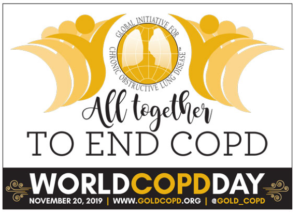 Dr Nicola Roberts is a Senior Lecturer at Glasgow Caledonian University in the UK and her research focuses on improving how we deliver care to those with respiratory disease.
Dr Nicola Roberts is a Senior Lecturer at Glasgow Caledonian University in the UK and her research focuses on improving how we deliver care to those with respiratory disease.
It is coming up to World COPD day this month (20th November) and I wanted to highlight the lack of recognition of respiratory disease. Respiratory disease has a much lower profile compared to heart disease and cancer but still affects a considerable amount of the population. Lung disease is one of the three biggest causes of mortality along with heart disease and non-respiratory cancers. Around 10,000 people in the UK are diagnosed with a lung disease every week (1). Often respiratory symptoms are overlooked, and we consider them just a side effect of old age, but it is something we should all consider. The most common symptoms of respiratory disease are shortness of breath and cough, and if these last longer than four weeks then these should be investigated. Shortness of breath often creeps up on you and it is important to ask patients whether when walking, they can keep up with their peers and investigate their medical history including their smoking history. It is also key not to rule out non-smokers, these individuals should still be investigated to identify other causes for breathlessness and may have occupational and other exposures that can still damage the lungs. There can be differences between men and women in the way that symptoms are reported, in a study investigating those with suspected COPD women were more likely to report allergies, symptoms starting earlier in life, and being less likely than men to report breathlessness as the main symptom (2).
We know that the general public think of COPD as the “invisible condition”. Studies have shown that COPD is often under-diagnosed or diagnosed late when individuals are reporting significant symptoms and we need to start picking this up earlier (3,4). Aside from the usual pharmaceutical treatment options it is important to consider several other actions. This includes spirometry to confirm diagnosis, flu vaccination, smoking cessation advice, and where appropriate referral to pulmonary rehabilitation.
Maintaining physical fitness and activity is important because difficulty breathing may lead to individuals cutting back on their usual activities. Pulmonary rehabilitation can be a really effective intervention for many with respiratory conditions such as COPD. It has been shown to be a cost-effective intervention, combining exercise and education in a social group environment (5). However not enough of those with respiratory conditions get referred or, last the course and complete pulmonary rehabilitation – in part because referrers often don’t know enough about it (6). There are some fantastic videos which everyone can use to learn more about pulmonary rehabilitation in the links  below. Encouraging everyone to keep doing any physical activity is crucial for example, singing (7), mindfulness (8), yoga (9), and tai chi (9).
below. Encouraging everyone to keep doing any physical activity is crucial for example, singing (7), mindfulness (8), yoga (9), and tai chi (9).
For health professionals, there is a wealth of resources available! The British Thoracic Society resources have clinical guidelines for managing multiple respiratory conditions (10). Both the British Lung foundation and Chest Heart and Stroke Scotland have leaflets that can provide information for patients and healthcare professionals around management and treatment of respiratory disease (11,12). The Primary Care Respiratory Society (PCRS) also recommend some tools, resources and training for managing respiratory patients (13). There is also a respiratory educational resource developed by Chest, Heart and Stroke Scotland to support health professionals through eLearning for those who want to extend their knowledge (14).
Links to resources
RESPe clip 1 – Introduction to Pulmonary Rehabilitation youtu.be/osKfITJ58aA
RESPe clip 2 – Pulmonary Rehabilitation – Patient Assessment youtu.be/QDPMpwugIfg
RESPe clip 3 – Pulmonary Rehabilitation – Exercise Class youtu.be/LnT4vm4QTgA
RESPe clip 4 – Pulmonary Rehabilitation – Education https://youtu.be/-EXR2hJo6Gk
RESPe clip 5 – Pulmonary Rehabilitation – The patient experience https:// youtu.be/Tqf6a2ZN0FA
RESPe clip 6 – Pulmonary Rehabilitation – After Pulmonary Rehabilitation https://youtu.be/DFjjG7TfQ5k via
For further information please contact nicola.roberts@gcu.ac.uk or @DrNRoberts on Twitter
References:
1. British Lung Foundation. Lung disease in the UK – big picture https://statistics.blf.org.uk/lung-disease-uk-big-picture#numbers-developed-lung-disease-uk
2. Roberts NJ, Patel IS, Partridge MR. The diagnosis of COPD in primary care; gender differences and the role of spirometry. Respir Med. 2016 Feb;111:60-3. doi: 10.1016/j.rmed.2015.12.008.
3. Marsh S E, Travers J, Weatherall M Proportional classifications of COPD phenotypes. Thorax 2008; 63: pp 761-7.
4. Larsson K, Janson C, Ställberg B, et al. Impact of COPD diagnosis timing on clinical and economic outcomes: the ARCTIC observational cohort study. Int J Chron Obstruct Pulmon Dis. 2019;14:995–1008. Published 2019 May 13. doi:10.2147/COPD.S195382
5. McCarthy B, Casey D, Devane D, Murphy K, Murphy E, Lacasse Y. Pulmonary rehabilitation for chronic obstructive pulmonary disease. Cochrane Database Syst. Rev. 2015; (2): CD003793.
6. Cox NS, Oliveira CC, Lahham A, Holland AE. Pulmonary rehabilitation referral and participation are commonly influenced by environment, knowledge, and beliefs about consequences: a systematic review using the Theoretical Domains Framework,
Journal of Physiotherapy. 2017;63: 84-93.
7. Lewis A, Thomas J COPD and Singing for Lung Health: A Patient and Clinician. Pulmonary Therapy 2018:121–124
8. Roxane Raffin Chan,1 Nicholas Giardino,2 Janet L Larson3 A pilot study: mindfulness meditation intervention in COPD International Journal of COPD 2015;10:445—454
9. Reychler G, Poncin W, Montigny S, Luts A, Caty G, Pieters T. Efficacy of yoga, tai chi and qi gong on the main symptoms of chronic obstructive pulmonary disease: A systematic review. Respiratory Medicine and Research 2019;75:13-25
10. British Thoracic Society https://www.brit-thoracic.org.uk/quality-improvement/guidelines/
11. British Lung Foundation https://shop.blf.org.uk/collections/lung-health-information
12. Chest Heart and Stroke Scotland https://www.chss.org.uk/chest-information-and-support/support-for-you/chest-factsheets-and-booklets/
13. Primary Care Respiratory Society https://www.pcrs-uk.org/fittocare/standard
14. Chest Heart and Stroke Scotland RESPe: Respiratory Education to Support Professionals through eLearning https://www.chss.org.uk/news/respe-respiratory-education-to-support-professionals-through-elearning/